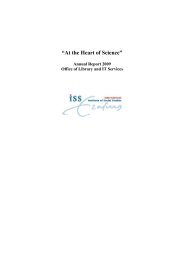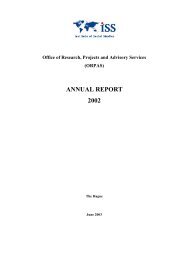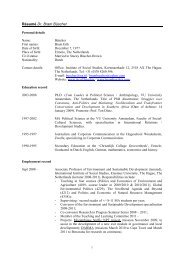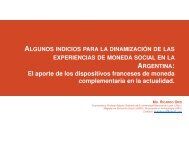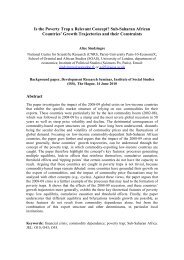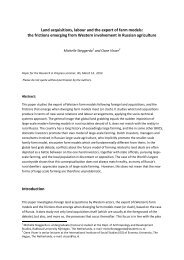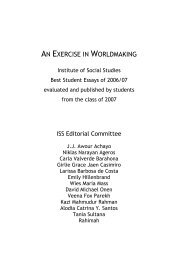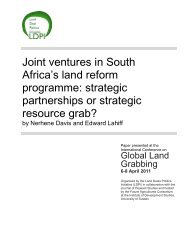AN EXERCISE IN WORLDMAKING 2009 - ISS
AN EXERCISE IN WORLDMAKING 2009 - ISS
AN EXERCISE IN WORLDMAKING 2009 - ISS
You also want an ePaper? Increase the reach of your titles
YUMPU automatically turns print PDFs into web optimized ePapers that Google loves.
144 STEF<strong>AN</strong>IA DONZELLI<br />
Encuentro, to make this investigation collective and participatory as<br />
much as possible, notwithstanding time constraints. This inclination to<br />
participatory research is in line with my conceptualization of research as<br />
praxis. In fact, collective discussions and dialogue with people from Puntos<br />
or who have been exposed to Sexto Sentido will involve them (and<br />
me) in moment of reflection for action, thus in a strongly political activity.<br />
Furthermore, the choice of not using the term focus group to refer<br />
to the discussion meeting wants to highlight the importance of creating<br />
spaces for mutual learning between the researcher and the participants.<br />
CONCLUSION<br />
In this essay I have introduced my ongoing research “Feminist Representations<br />
of Rape and Victimization: The Case of Sexto Sentido in Nicaragua”<br />
and I have reflected on how the epistemological position that I<br />
would like to adopt in this investigation can support my core assumptions<br />
on reality. More specifically, I have presented post-modernism, its<br />
feminist variant and some elements of Gramscian thought, highlighting<br />
which of the epistemological virtues of these postures I value more. The<br />
biggest effort of this essay has been to try to make post-modernism and<br />
Gramscian thought work coherently. Finally, I have explained how my<br />
methodology is consistent with my epistemological posture. Still, I have<br />
some doubts on a precise point: in certain moments I cannot understand<br />
if my opinion tends more to asserting an objective need of emancipation<br />
or to relativising it. It seems to me that oppression is self-evident in this<br />
world, but at the same time to impose any type of universalism appears<br />
as another form of oppression. In any case, I have an entire life in front<br />
of me to clarify more this point: the hope never dies!<br />
REFERENCES<br />
Cameron, J. (<strong>2009</strong>) The Epistemology of Post-modernism and Poststructuralism,<br />
Book draft mimeo<br />
De Laurentis, T. (1987). Technologies of Gender. Essays on Theory, Film and Fiction.<br />
Bloomington and Indianapolis, Indiana University Press.<br />
Diamond, L. M. (2006). "Careful What You Ask For: Reconsidering Feminist<br />
Epistemology and Autobiographical Narrative in Research on Sexual Identity<br />
Development." Journal of Women in Culture and Society 31(2): 471-491.<br />
Eco, U. (1962). Opera Aperta. Forma e Indeterminazione nelle Poetiche Contemporanee.<br />
Milano, Bompiani.



